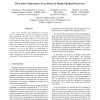Free Online Productivity Tools
i2Speak
i2Symbol
i2OCR
iTex2Img
iWeb2Print
iWeb2Shot
i2Type
iPdf2Split
iPdf2Merge
i2Bopomofo
i2Arabic
i2Style
i2Image
i2PDF
iLatex2Rtf
Sci2ools
SBACPAD
2003
IEEE
2003
IEEE
The Limits of Speculative Trace Reuse on Deeply Pipelined Processors
Trace reuse improves the performance of processors by skipping the execution of sequences of redundant instructions. However, many reusable traces do not have all of their inputs ready by the time the reuse test is done. For these cases, we developed a new technique called Reuse through Speculation on Traces (RST), where trace inputs may be predicted. This paper studies the limits of RST for modern processors with deep pipelines, as well as the effects of constraining resources on performance. We show that our approach reuses more traces than the non-speculative trace reuse technique, with speedups of 43% over a non-speculative trace reuse and 57% when memory accesses are reused.
Computer Architecture | Hardware | Non-speculative Trace Reuse | SBACPAD 2003 | Technique Called Reuse | Trace Reuse |
| Added | 05 Jul 2010 |
| Updated | 05 Jul 2010 |
| Type | Conference |
| Year | 2003 |
| Where | sbacpad |
| Authors | Maurício L. Pilla, Amarildo T. da Costa, Felipe M. G. França, Bruce R. Childers, Mary Lou Soffa |
Comments (0)

